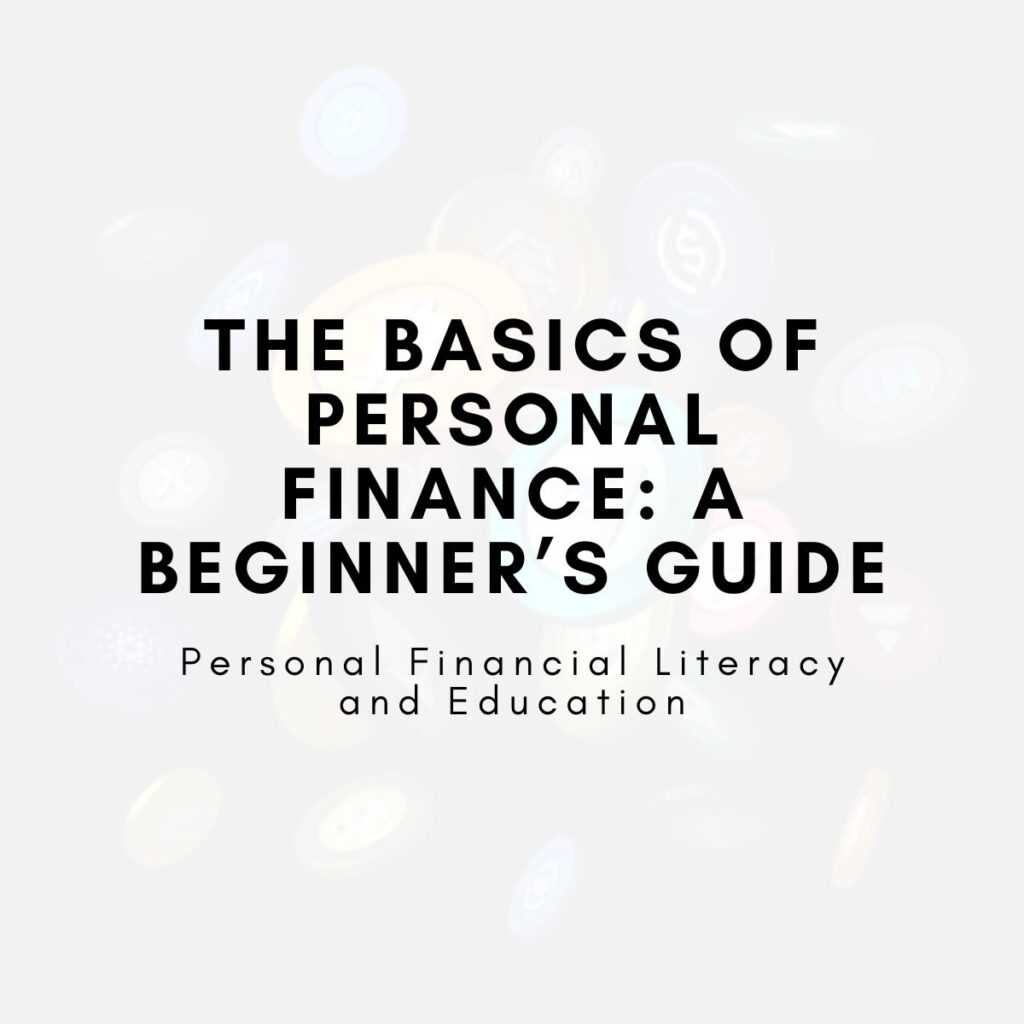
What are the basics of personal finance for beginners?
Personal finance is about managing your money, planning for your future, and achieving financial goals. For beginners, understanding the fundamentals such as budgeting, saving, investing, and debt management is key to building a solid financial foundation.
Summary Table: The Basics of Personal Finance
| Topic | Key Points | Example |
|---|---|---|
| Understanding Personal Finance | Personal finance involves managing money, budgeting, saving, investing, and debt management. | Tracking monthly expenses, setting savings goals, and budgeting. |
| Creating a Budget | Start by tracking income and expenses, setting financial goals, and adjusting as needed. | Using tools like Mint or a simple spreadsheet to track spending. |
| Building an Emergency Fund | Save 3-6 months of living expenses to cover unexpected expenses. | Setting aside $500-$1,000 initially, then increasing savings. |
| Managing Debt | Prioritize paying off high-interest debt and avoid accumulating new debt. | Paying off credit card debt before student loans. |
| Investing for the Future | Start investing early in stocks, bonds, mutual funds, and retirement accounts. | Opening an IRA or investing in a diversified stock portfolio. |
| Retirement Planning | Begin saving for retirement with a 401(k) or IRA, taking advantage of employer matching. | Contributing 10% of income to a 401(k) and utilizing employer match. |
| Protecting Your Finances | Get insurance coverage and create a will to protect your assets and loved ones. | Purchasing life and health insurance, drafting a basic will. |
This table summarizes the core areas of personal finance and offers practical examples to help beginners understand how to take action on each aspect. It serves as a quick reference guide for those starting their financial journey.
Introduction
Personal finance can often seem overwhelming, especially when you’re just starting out. With all the financial products, terminology, and advice available, it can be hard to know where to begin. However, mastering the basics of personal finance is essential for gaining control over your money, planning for your future, and achieving long-term financial goals.
Whether you’re fresh out of school, beginning your first job, or simply trying to get a better grasp of your finances, learning the fundamental principles of budgeting, saving, investing, and managing debt is the first step toward financial security. In this guide, we will walk you through the essential elements of personal finance and provide you with practical steps to manage your money effectively.
1. Understanding Personal Finance: What It Is and Why It Matters
What Is Personal Finance?
Personal finance refers to the management of an individual’s financial activities, including earning, saving, spending, investing, and planning for future expenses. It encompasses budgeting, setting financial goals, and making informed decisions about how to use and invest your money.
Why Is Personal Finance Important?
A solid understanding of personal finance enables you to take control of your financial future. By learning how to budget, save, and invest wisely, you can avoid debt, grow your wealth, and work toward achieving financial independence. With the right knowledge, you can make informed decisions that will support your long-term financial goals.
2. Creating a Budget: The Foundation of Personal Finance
What Is a Budget?
A budget is a plan for managing your income and expenses. It helps you track where your money is going and ensures that you’re living within your means. By creating and sticking to a budget, you can avoid unnecessary spending and allocate money toward your financial goals.
Steps to Create a Budget
- Track Your Income: Determine how much money you earn each month, including your salary, side hustles, or any passive income streams.
- List Your Expenses: Write down your fixed expenses (e.g., rent, utilities, subscriptions) and variable expenses (e.g., groceries, entertainment).
- Set Financial Goals: Define your financial goals and allocate money toward them each month, such as saving for an emergency fund, paying off debt, or investing for the future.
- Adjust and Monitor: Review your budget regularly and make adjustments if necessary to stay on track with your goals.
Budgeting Tips for Beginners
- Use budgeting apps or tools like Mint or YNAB (You Need a Budget) to make the process easier.
- Try the 50/30/20 rule: allocate 50% of your income to needs, 30% to wants, and 20% to savings and debt repayment.
- Prioritize your savings and debt repayment before spending on discretionary items.
3. Saving for the Future: Building an Emergency Fund
What Is an Emergency Fund?
An emergency fund is money set aside to cover unexpected expenses, such as medical bills, car repairs, or job loss. It provides a financial cushion that can help you avoid going into debt when life throws you a curveball.
How Much Should You Save?
Financial experts recommend having at least three to six months’ worth of living expenses in an emergency fund. If you have dependents or are self-employed, aim for the higher end of that range.
Where Should You Keep Your Emergency Fund?
Your emergency fund should be easily accessible, so consider keeping it in a high-yield savings account or money market account. Avoid investing it in stocks or long-term investments, as you may need quick access to this money.
Tips for Building an Emergency Fund
- Start small: If saving three to six months’ worth of expenses seems daunting, begin by saving $500 or $1,000 as a short-term goal.
- Automate your savings: Set up an automatic transfer to your emergency fund account each month.
- Cut back on unnecessary spending to free up more money for savings.
4. Managing Debt: How to Stay in Control
Types of Debt
There are two main types of debt: good debt and bad debt.
- Good debt includes loans that have the potential to build wealth, such as a mortgage or student loan.
- Bad debt typically refers to high-interest debt, like credit card debt or payday loans, which can quickly spiral out of control.
How to Manage Debt?
- Create a Debt Repayment Plan: Prioritize paying off high-interest debt first, then move on to lower-interest debt. The debt snowball and avalanche methods are two effective strategies.
- Avoid New Debt: Refrain from taking on new debt while you’re working on paying off existing debt. This will help you stay focused on your repayment goals.
Tips for Debt Management
- Pay more than the minimum payment whenever possible to reduce interest charges.
- Consider consolidating your debt into a single loan with a lower interest rate to simplify payments.
- Avoid using credit cards for non-essential purchases while working on paying off debt.
5. Investing: Growing Your Wealth
Why Is Investing Important?
Investing allows you to grow your wealth over time by putting your money into assets such as stocks, bonds, or real estate. The earlier you start investing, the more you can benefit from compound interest.
Types of Investments
- Stocks: Buying shares in companies gives you partial ownership and the potential for dividends and capital gains.
- Bonds: Bonds are debt securities issued by governments or companies. They offer a fixed interest payment and are generally less risky than stocks.
- Real Estate: Investing in property can provide rental income and long-term appreciation.
- Mutual Funds and ETFs: These pooled investment funds allow you to diversify your portfolio with less risk by investing in multiple assets at once.
How to Get Started with Investing?
- Start Small: Begin with a small amount of money and gradually increase your investments as you learn more.
- Diversify Your Portfolio: Spread your investments across different asset classes to reduce risk.
- Use Retirement Accounts: Consider investing in retirement accounts like IRAs or 401(k)s, which offer tax benefits.
Tips for Beginner Investors
- Do your research before investing in any asset.
- Avoid trying to time the market—focus on long-term goals.
- Consider working with a financial advisor if you’re unsure about where to invest.
6. Retirement Planning: Securing Your Future
Why Plan for Retirement?
Retirement planning is crucial for ensuring that you can live comfortably when you’re no longer working. The earlier you start saving for retirement, the more time your money has to grow through compound interest.
Types of Retirement Accounts
- 401(k): Offered by employers, this retirement account allows you to contribute pre-tax income and often includes employer matching.
- IRA (Individual Retirement Account): IRAs allow individuals to contribute tax-deferred or tax-free funds toward retirement.
- Roth IRA: Contributions to a Roth IRA are made with after-tax income, but qualified withdrawals are tax-free.
How to Start Saving for Retirement?
- Contribute Regularly: Set up automatic contributions to your retirement accounts.
- Take Advantage of Employer Matches: If your employer offers a 401(k) match, try to contribute enough to take full advantage of it.
- Invest in a Diversified Portfolio: Include a mix of stocks, bonds, and other assets in your retirement account to maximize growth.
7. Protecting Your Finances: Insurance and Estate Planning
Why Is Insurance Important?
Insurance helps protect you from financial hardship in case of unexpected events such as illness, accidents, or property damage. Common types of insurance include health, auto, renters, and life insurance.
What Is Estate Planning?
Estate planning involves making arrangements for the distribution of your assets after your death. This may include creating a will, setting up trusts, and designating beneficiaries for your accounts.
Tips for Protecting Your Finances
- Get Health Insurance: Ensure that you’re covered for medical expenses to avoid large bills.
- Consider Life Insurance: If you have dependents, life insurance can help provide for them in case of your death.
- Create a Will: Even if you don’t have many assets, it’s important to designate who will receive your belongings and handle your affairs.
Conclusion
Mastering the basics of personal finance is essential for achieving financial stability and long-term success. By understanding budgeting, saving, investing, debt management, and retirement planning, you can create a solid foundation for your financial future. Start by setting small, achievable goals and gradually work toward building a strong financial portfolio. With time, discipline, and consistent effort, you’ll be on your way to financial freedom.
Key Takeaways
- Budgeting is Essential: Track your income and expenses to manage your money effectively.
- Save for Emergencies: Build an emergency fund to cover unexpected costs.
- Invest Early: Begin investing as soon as possible to take advantage of compound interest.
- Manage Debt Wisely: Focus on paying off high-interest debt and avoid taking on new debt.
- Plan for Retirement: Start saving for retirement early using tax-advantaged accounts.
- Protect Your Finances: Ensure you have proper insurance coverage and estate planning in place.




